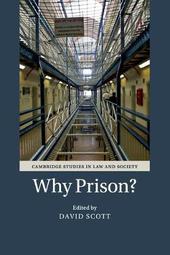
|
Why Prison?
Paperback / softback
Main Details
| Title |
Why Prison?
|
| Authors and Contributors |
Edited by David Scott
|
| Series | Cambridge Studies in Law and Society |
|---|
| Physical Properties |
| Format:Paperback / softback | | Pages:408 | | Dimensions(mm): Height 229,Width 150 |
|
| ISBN/Barcode |
9781107521803
|
| Classifications | Dewey:364.601 |
|---|
| Audience | | Professional & Vocational | |
|---|
| Illustrations |
1 Halftones, unspecified
|
|
Publishing Details |
| Publisher |
Cambridge University Press
|
| Imprint |
Cambridge University Press
|
| Publication Date |
16 April 2015 |
| Publication Country |
United Kingdom
|
Description
Prison studies has experienced a period of great creativity in recent years, and this collection draws together some of the field's most exciting and innovative contemporary critical writers in order to engage directly with one of the most profound questions in penology - why prison? In addressing this question, the authors connect contemporary penological thought with an enquiry that has received the attention of some of the greatest thinkers on punishment in the past. Through critical exploration of the theories, policies and practices of imprisonment, the authors analyse why prison persists and why prisoner populations are rapidly rising in many countries. Collectively, the chapters provide not only a sophisticated diagnosis and critique of global hyper-incarceration but also suggest principles and strategies that could be adopted to radically reduce our reliance upon imprisonment.
Author Biography
David Scott is Senior Lecturer in Criminology and Criminal Justice at the School of Education and Social Science, University of Central Lancashire.
Reviews'Finally, David Scott's edited collection Why Prison? will have the most relevance to prison practitioners and will also have the broadest appeal. It offers an impressive array of leading scholars dissecting the emergence of global hyper-incarceration and strategies for change.' Jamie Bennett, Prison Service Journal 'This collection of exceptional scholarship reflects a critical juncture in penal reform that moves the discourse beyond that of mass incarceration. The contributing authors and their research on the inefficacy of incarceration make a compelling case for penal reform. A truly innovative, thought-provoking and engaging text, Why Prison? unearths seldom-considered lines of enquiry rather than merely following the well-worn paths that have been previously pursued by penological scholars. In sum, editor Scott and colleagues have done a superb job of providing readers with a profound opportunity to participate in a creative and comprehensive conversation about one of the essential social questions of our time: 'why prison?'' H. Bennett Wilcox III, Criminal Law and Criminal Justice
|